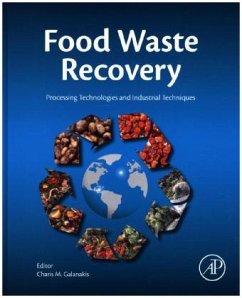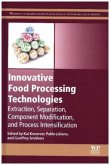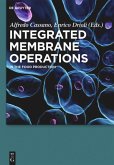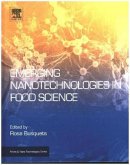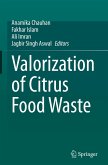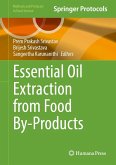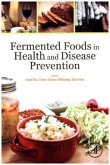Food Waste Recovery: Processing Technologies and Industrial Techniques acts as a guide to recover valuable components of food by-products and recycle them inside the food chain, in an economic and sustainable way. The book investigates all the relevant recovery issues and compares different techniques to help you advance your research and develop new applications. Strong coverage of the different technologies is included, while keeping a balance between the characteristics of current conventional and emerging technologies. This is an essential reference for research outcomes.
"This is a must-have book and should be used in every food science curriculum. This book would also be an excellent reference book for companies in the food industry or even the food value chain, from primary production through to the retail sector." --FST
"The information provided in Food Waste Recovery is very well organized and offers a comprehensive access to the information scattered in many technical and scientific publications. The books makes easy to find the potential of a specific waste or how to recover a molecule of economic interest with different technologies. One of the most innovative and interesting parts of the book is dedicated to emerging technologies such as radio-frequency drying, electroosmotic drying, the use of low temperature plasma, high hydrostatic pressure, ultrasounds, pulsed electrical fields or magnetic fields and the applications and implementations in different food sectors beyond the applications at laboratory or pilot stages. Definitely, the book is a "must have" for all those working with food waste recovery." --Aintzane Esturo, Technical Manager, SGF International e.V., Germany
"There is no doubt that with rising populations, food wastage is of ever growing significance. We are now at a point that it is no longer sufficient to simply reduce the amount of industrial or supply chain waste, whether agricultural or processing by-product, but to eliminate it. To achieve such targets, the inherent value; nutritional or functional, must be recovered from any waste stream. This requires a deep knowledge of the potential of such waste material, which in turn can drive the innovation process to realise that value. Food Waste Recovery edited by Dr. Charis Galankis provides the detailed insight needed to address these challenges head on. With detailed reviews of food wastage sources, potential value of waste streams and the traditional, innovative and emerging extraction and recovery technology, this book achieves the editors vision of producing an essential reference tool for food and drink professionals tackling the increasingly important issue of food waste." --Steve Osborn B.Sc. (hons), M.Phil., C.SCI., FIFST, Principal consultant - Food and Beverage, The Aurora Ceres Partnership Ltd.
"This book successfully captures the current outlook with regard to food waste valorisation, compiling the collaborative contributions of academic institutions and commercial organisations. Encompassing a breadth of separation and extraction technologies, both conventional and emerging, the book provides rich insight into the techniques which could either be employed in isolation or regarded as building blocks in a comprehensive biorefinery. Food Waste Recovery represents a much-needed toolkit, increasing the prospect of recovering high added-value compounds from organic byproducts. Moreover, it serves as a bridge between academia and industry, a vital handbook for anyone wanting to develop a food waste recovery application. Crucially, the book places priority on the ethical responsibility to maximise the efficient recovery of bioresources against the backdrop of ever-increasing pressure on natural resources due to climate change and rising populations. Thus, food waste valorisation is presented not simply as a commercial teaser; rather it is regarded as a vital activity as part of a coordinated strategy to ensure a sustainable food supply. Fundamentally, Dr. Galanakis has succeeded in drawing together accounts of the key technologies which will form the basis of any future biorefinery and this compilation marks a milestone in the journey towards that destination." --Andrew Gadd, Link2Energy, Industrial Symbiosis Services Medium
"The information provided in Food Waste Recovery is very well organized and offers a comprehensive access to the information scattered in many technical and scientific publications. The books makes easy to find the potential of a specific waste or how to recover a molecule of economic interest with different technologies. One of the most innovative and interesting parts of the book is dedicated to emerging technologies such as radio-frequency drying, electroosmotic drying, the use of low temperature plasma, high hydrostatic pressure, ultrasounds, pulsed electrical fields or magnetic fields and the applications and implementations in different food sectors beyond the applications at laboratory or pilot stages. Definitely, the book is a "must have" for all those working with food waste recovery." --Aintzane Esturo, Technical Manager, SGF International e.V., Germany
"There is no doubt that with rising populations, food wastage is of ever growing significance. We are now at a point that it is no longer sufficient to simply reduce the amount of industrial or supply chain waste, whether agricultural or processing by-product, but to eliminate it. To achieve such targets, the inherent value; nutritional or functional, must be recovered from any waste stream. This requires a deep knowledge of the potential of such waste material, which in turn can drive the innovation process to realise that value. Food Waste Recovery edited by Dr. Charis Galankis provides the detailed insight needed to address these challenges head on. With detailed reviews of food wastage sources, potential value of waste streams and the traditional, innovative and emerging extraction and recovery technology, this book achieves the editors vision of producing an essential reference tool for food and drink professionals tackling the increasingly important issue of food waste." --Steve Osborn B.Sc. (hons), M.Phil., C.SCI., FIFST, Principal consultant - Food and Beverage, The Aurora Ceres Partnership Ltd.
"This book successfully captures the current outlook with regard to food waste valorisation, compiling the collaborative contributions of academic institutions and commercial organisations. Encompassing a breadth of separation and extraction technologies, both conventional and emerging, the book provides rich insight into the techniques which could either be employed in isolation or regarded as building blocks in a comprehensive biorefinery. Food Waste Recovery represents a much-needed toolkit, increasing the prospect of recovering high added-value compounds from organic byproducts. Moreover, it serves as a bridge between academia and industry, a vital handbook for anyone wanting to develop a food waste recovery application. Crucially, the book places priority on the ethical responsibility to maximise the efficient recovery of bioresources against the backdrop of ever-increasing pressure on natural resources due to climate change and rising populations. Thus, food waste valorisation is presented not simply as a commercial teaser; rather it is regarded as a vital activity as part of a coordinated strategy to ensure a sustainable food supply. Fundamentally, Dr. Galanakis has succeeded in drawing together accounts of the key technologies which will form the basis of any future biorefinery and this compilation marks a milestone in the journey towards that destination." --Andrew Gadd, Link2Energy, Industrial Symbiosis Services Medium

